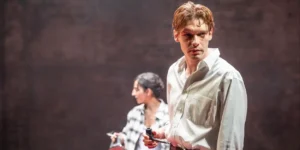Almeida Theatre
In their Angry And Young season, The Almeida has revisited two plays from the 1950s that helped revolutionise the English stage. Both concern working class people and are set in kitchens (hence the nickname ‘kitchen sink drama’?). Atri Banerjee directs John Osborne’s Look Back In Anger and Diyan Zora directs Arnold Wesker’s Roots. Each critic had a favourite, while often not liking the other: where some saw a striking portrait of anger and misogyny in Jimmy Porter in Look Back in Anger, others were merely disturbed; some admired Roots‘ defiant Beattie, others thought the play lacked passion. All admired the stars Billy Howle and Morfydd Clark. I’ve separated comments about the two plays but the star ratings sometimes covered both, and sometimes star ratings were omitted.
Look Back In Anger

The Guardian‘s Arifa Akbar (2★) was on the attack: ‘watching it now is a curiously cold anthropological experience’. ‘John Osborne’s pugilistic sweet-stall seller…looks like a charmless, self-pitying tyrant here who weaponises his working-class chip against his wife.’
Patrick Marmion in the Mail (2★) joined in, ‘There’s a strong seam of misogyny in all Osborne’s writing — and Howle does little more than lend this sullen, self-pitying exponent a babyish whimper. The play has little to teach us, and does less to amuse.’
The Times’ Clive Davis (3★) felt ‘watching the endlessly self-pitying Jimmy complain about his wife, Alison, is like watching a thoroughly one-sided boxing match’. Sam Marlowe in The Stage said, ‘The unrelenting verbiage of Jimmy Porter, as he assaults Ellora Torchia as his upper-class wife Alison with a battery of taunts and insults, is heavy going and quickly begins to seem like overkill.’
Fiona Mountford in the i (3★) called it, ‘this interminable bore of an often misogynistic rant’. Susannah Clapp in The Observer (3) took a similar stand: ‘Billy Howle dazzles as Porter: as raw and ranging as Poor Tom on King Lear’s heath. But for all their force, his speeches are puny: Osborne glorying in his misogynistic power.’
Andrjez Lukowksi of Time Out (3★) commented, ‘antihero Jimmy Porter’s abusive treatment of his upper middle class wife Alison is deeply problematic. It was doubtless meant to be so at the time as well, but it was written in an age with a different attitude towards domestic violence, and I think the passage of years has made Jimmy an increasingly repulsive, harder to emphasise with character. ‘ He didn’t like with the way the production moved away from the original’s naturalism: ‘At the end of the day a Pinteresque take on Osborne neither conveys the shattering impact of Look Back in Anger’s original incarnation nor, crucially, can it out-Pinter Pinter.’
Aleks Sierz at The Arts Desk (4★) took a more positive view: ‘What’s exciting theatrically is Osborne’s truthfulness in depicting masculinist attitudes which are as prevalent today as they were some 70 years ago. Yes Jimmy rants; yes, he’s unbearable (we have all surely met his type); yes, his opinions are disagreeable. But, boy, does he light up the stage.’
Tim Bano in The Standard (4★) called it ‘a crackling piece of drama’. For him, ‘Banerjee pulls the tension tighter and tighter, a nasty, thrilling tension, in which Porter expresses his vile, misogynistic, insulting views, shoving them at his wife and friend Cliff because there’s nowhere else for them to go.’
The Telegraph‘s Dzifa Benson (4★) said, ‘Howle portrays (Jimmy) as a coercive abuser, with a nervy, febrile energy that always feels dangerously on edge and ready to explode at any minute.’
Matt Wolf for LondonTheatre (4★) said, ‘you shiver at Jimmy’s weaponising of verbal finesse – language from his mouth cuts arguably more deeply than a knife – even as you sense a lost and haunted manchild adrift in a world that, as Jimmy knows full well, doesn’t give a damn.’
Sarah Hemming in The Financial Times (4★) declared, ‘It’s a blazing production of a tough, ugly, angry, desperate, sad play.’ Sarah Crompton at Whats on Stage (4★) observed, ‘(Howle’s) Jimmy really is lost and by emphasising that, Banerjee subtly counteracts Osborne’s unbearable desire to see this ruthless man-child as a hero.’
For Alexander Cohen at Broadway World (5★) was the most enthusiastic, ‘To experience John Osborne gut the audience like a fish, all their grotesque innards splayed out in front of you is as intoxicating as it is nasty…Banerjee makes it clear as day: his clenched indignation is even more pathetic in 2024.’
Roots

The Guardian (4★) said, ‘It is a static play but there are masterful subtleties around class and interplay of characters built into its pace, alongside humour.’ The Observer (4★) called it ‘an extraordinary piece of work: intimate and visionary’.
The Times (4★) noted, ‘Morfydd Clark is utterly convincing in this role. Beatie’s tragedy is that she patronises her folks yet has acquired all her new values from a bohemian boyfriend’. LondonTheatre (4★) called Clark ‘a stonking star turn’.
Dzifa Benson in the Telegraph (4★) said, ‘Morfydd Clark lends (Beattie) a breezy charm and resilience that seem to belie the raw vulnerability she displays when Beatie’s mother gives her a dressing down.’
The Financial Times (4★) enjoyed ‘Diyan Zora’s deftly paced and beautifully acted production of Roots … She keeps Wesker’s punctilious naturalism and yet frames the drama as a memory play.’
The i (3★) said, ‘Wesker lets out an impassioned cry for working-class liberation through greater curiosity and captures the timeless emotional theme of the facility with which children blame their parents for their own failings. Beatie has strong roots in this limited but loving place; a top-quality 100 minutes of drama shows that she also has a winningly defiant mind of her own.’
The Stage thought, ‘Clark makes Beatie’s eventual epiphany powerfully moving.’ As to the production, ‘overall, it’s a brisk staging that serves the play well, and if it does so without any particular innovation, it’s crammed with texture and feeling.’
Whats On Stage (3★) took a different view: ‘The problem is that Wesker’s writing lacks the ability to leap into the family’s minds; it’s a sociological study rather than a drama. Diyan Zora’s stylised, non-naturalistic staging pushes them further away.’ For the Mail (3★), ‘Wesker’s play…works best as social history.’
The Standard (3★) didn’t find much to get excited about: ‘The anger is deadened, drowned out in a society that’s far angrier, and far louder. Zora’s revival goes some way in cracking open the slightly dry carapace that surrounds the piece, and there are undoubtedly great moments, but too often it feels like an experiment in reviving a forgotten play, too much like homework.’
Critics’ average ratings:
Look Back In Anger 3.5★ Roots 3.6★
Look Back In Anger and Roots can be seen at The Almeida Theatre until 23 November 2024. Buy direct from the theatre